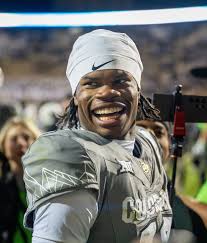
Introduction to Travis Hunter
Travis Hunter, a star athlete and the number one recruit in the 2022 college football recruiting class, has quickly become a significant figure in the world of college football. Transferring from Jackson State University to the University of Colorado Boulder, Hunter’s journey not only showcases his immense talent but also underscores the evolving landscape of college sports. His commitment to playing under Coach Deion Sanders, a legendary figure both as a player and coach, has garnered considerable media attention and public interest.
Hunter’s Journey and Achievements
During his time at Jackson State, Hunter demonstrated exceptional skills on the field, contributing to an impressive team record and acclaim for his ability as a two-way player, excelling as both a wide receiver and cornerback. His performances drew attention from NFL scouts and football fans alike, establishing him as a dynamic athlete capable of changing the game. Following the announcement of Deion Sanders’ move to Colorado, Hunter made headlines once more by choosing to transfer, believing that he could further elevate his game and help revive a storied program that had seen better days.
Current Season and Performance
As of the current NCAA season in 2023, Hunter has made a significant impact at Colorado, recording impressive game statistics and displaying tremendous versatility. His ability to play multiple positions has allowed the Buffaloes to leverage his talents in various formations and situations. Hunter’s on-field leadership and work ethic have also inspired his teammates, further adding to his reputation as not just a star player but a natural leader. The attention around him is not solely about numbers, but about the broader implications of his choices and influences on the sport.
The Broader Impact on College Football
Beyond his extraordinary skills, Hunter’s presence at Colorado symbolizes the shifting dynamics of college football. His decision to follow Coach Sanders reflects a growing trend where athletes are increasingly valuing personal growth and exposure over traditional powerhouses. This trend has sparked discussions about the future of college athletics, particularly regarding recruitment strategies, athlete branding, and the overarching influence of coaching legends. Hunter’s journey may set a precedent for future athletes navigating their paths in college sports, emphasizing the importance of personal brand and fit over historical prestige.
Conclusion
Travis Hunter’s rise in college football is not just about his achievements on the field; it’s about the potential shift in how young athletes view their careers in sports. As he continues to break barriers and redefine expectations, his journey serves as a beacon of inspiration for aspiring athletes. The implications of his decisions will likely resonate in college football for years, ultimately shaping recruitment practices and player choices. Fans can expect to see more from Hunter as he evolves, continuing to captivate audiences while influencing the next generation of football players.



